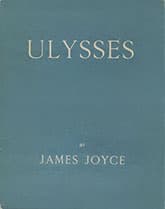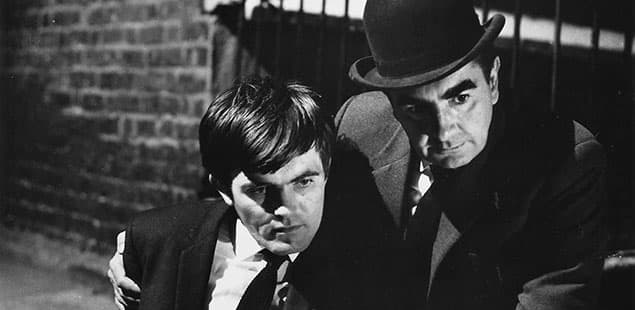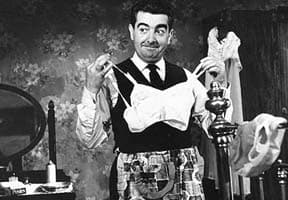Ulysses
Critique • Quotes • At the movies
 First edition
First editionFirst publication
1822
Literary form
Novel
Genres
Literary
Writing language
English
Author's country
Ireland
Length
Approx. 286,000 words

Stephen Dedalus (Maurice Roëves) and Leopold Bloom (Milo O'Shea) connect in 1967's Ulysses.
They made a movie out of this?
Ulysses (1967): Film, 132 minutes; director Joseph Strick; writers Fred Haines, Joseph Strick; featuring Milo O'Shea, Barbara Jefford, Maurice Roëves
Few moviegoers who don't know the book Ulysses would bother with a film based on it. Why would they? The novel's stream-of-consciousness narration and its pastiche of literary styles are virtually impossible to convey in visual media.
Take these print characteristics away, strip Ulysses to its action, and you find James Joyce's novel is really not much of a story. Two men wander around Dublin and eventually share a cup of cocoa. Not exactly a romantic or thrilling entertainment.
Knowledge of this fact has to affect how any filmmaker or reviewer approaches an adaptation. It has to be assessed for those who have read the book—or have tried to.
Ticking all the boxes
The 1967 adaptation of Ulysses is quite a literary, talkative film, very faithful to the novel—almost a students' notes primer. The reader can go through it with a checklist of the highlights of Leopold Bloom's and Stephen Dedalus's travels, ticking off the famous lines of dialogue ("History is a nightmare from which I am trying to awake"), the major themes (the hold of the church on Ireland, anti-Semitism, the father-son relationship, sexual repression), the perils that Joyce sets up as ironic parallels of those in Homer's Odyssey (the sirens on the beach, the Hades of the red-light district), as well as almost the entirety of Molly Bloom's uncensored concluding monologue. The black-and-white texture of the film seems to emphasize its reliance on text.
Of course, you could fit only a small fraction of Joyce's long, complicated work into a watchable film. Writers Fred Haines and Joseph Strick (Strick also producing and directing), were nominated for an Academy award for their brilliant job of boiling it down into a couple of hours without distorting the novel entirely. Strick went on to do A Portrait of the Artist as a Young Man in 1977.
The acting is also quite capable, starting with the star of stage, film and television, Milo O'Shea, as a perfect Leopold Bloom—meek, bumbling, clever, libidinous, courageous and kind-hearted all at once. A young Maurice Roëves, known for his later British TV appearances including on EastEnders, is a distracted Stephen Dedalus. Barbara Jefford is a slatternly Molly Bloom. T.P. McKenna, who later played Stephen's father in Portrait of the Artist, is wicked as Stephen's intellectual friend, Buck Mulligan, though he is not "Stately, plump" as described in the novel's first words. A host of other terrific Irish and English character actors add realistic support as Dubliners.
But the serious distortion in the film for book lovers is due to the film not being a book. Instead of sensing the world as filtered and distorted through the individual characters' streams of thought as in the novel, we are presented each scene visually—with the characters' external and internal dialogue overlaying it.
Stephen's stroll across the beach, for instance, in the novel is a convolution of emotions, intellectual ideas and free associations with all that he sees and thinks; in the film it becomes simply a man walking across a beach pretending to be blind and having a few voice-over observations. Similarly Bloom's description of what he sees about town, his associations, his prurient fantasies and anxieties, can only be hinted at in the cinematic presentation of the funny little man in a bowler hat as he walks the streets.
The fantasy sequences in particular are too much in our face, coming across more as dress-up charades than as elaborate subconscious inventions. Too literal. Too much in our eyes, rather than in our mind's-eyes.
Despite all this criticism about how the film falls short of the novel, it's still surprisingly good for a fan of the supposedly unfilmable novel. Obviously made on a modest budget but ambitious, it is quite successful in getting across the brunt of the novel.
However, as you likely know from my comments on the novel, I'm not a big fan of it. It's way too long and dull for one thing. The film at 120 minutes is also too slow and dull in parts. Even the best part of the book, Molly's earthy soliloquy, seems to go on and on when one is watching it illustrated line by line on film.
— Eric
Critique • Quotes • At the movies
1967, 2003


